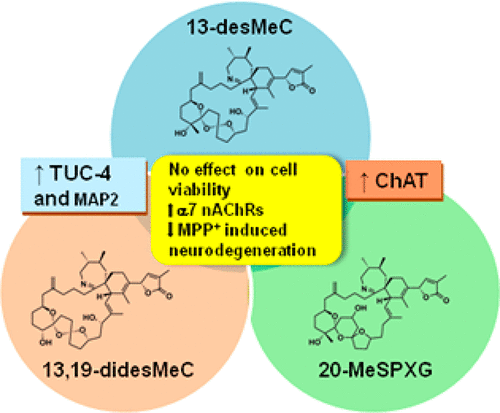当前位置:
X-MOL 学术
›
ACS Chem. Neurosci.
›
论文详情
Our official English website, www.x-mol.net, welcomes your
feedback! (Note: you will need to create a separate account there.)
In Vitro Effects of Chronic Spirolide Treatment on Human Neuronal Stem Cell Differentiation and Cholinergic System Development
ACS Chemical Neuroscience ( IF 4.1 ) Pub Date : 2018-03-08 00:00:00 , DOI: 10.1021/acschemneuro.8b00036 Andrea Boente-Juncal 1 , Aida G. Méndez 1 , Carmen Vale 1 , Mercedes R. Vieytes 2 , Luis M. Botana 1
ACS Chemical Neuroscience ( IF 4.1 ) Pub Date : 2018-03-08 00:00:00 , DOI: 10.1021/acschemneuro.8b00036 Andrea Boente-Juncal 1 , Aida G. Méndez 1 , Carmen Vale 1 , Mercedes R. Vieytes 2 , Luis M. Botana 1
Affiliation

|
Spirolides (SPX) are marine toxins, produced by dinoflagellates that act as potent antagonists of nicotinic acetylcholine receptors. These compounds are not toxic for humans, and since there are no reports of human intoxications caused by this group of toxins they are not yet currently regulated in Europe. Currently 13-desmethyl spirolide C, 13,19-didesmethyl spirolide C, and 20-methyl spirolide G are commercially available as reference materials. Previous work in our laboratory has demonstrated that after 4 days of treatment of primary mice cortical neurons with 13-desmethyl spirolide C, the compound ameliorated the glutamate induced toxicity and increased acetylcholine levels and the expression of the acetylcholine synthesizing enzyme being useful both in vitro and in vivo to decrease the brain pathology associated with Alzheimer’s disease. In this work, we aimed to extend the study of the neuronal effects of spirolides in human neuronal cells. To this end, human neuronal progenitor cells CTX0E16 were employed to evaluate the in vitro effect of spirolides on neuronal development. The results presented here indicate that long-term exposure (30 days) of human neuronal stem cells to SPX compounds, at concentrations up to 50 nM, ameliorated the MPP+-induced neurotoxicity and increased the expression of neuritic and dendritic markers, the levels of the choline acetyltransferase enzyme and the protein levels of the α7 subunit of nicotinic acetylcholine receptors. These effects are presumably due to the previously described interaction of these compounds with nicotinic receptors containing both α7 and α4 subunits. All together, these data emphasize the idea that SPX could be attractive lead molecules against neurodegenerative disorders.
中文翻译:

慢性螺旋体治疗对人神经元干细胞分化和胆碱能系统发育的体外影响
螺旋藻(SPX)是海洋毒素,由鞭毛藻产生,它们可作为烟碱乙酰胆碱受体的有效拮抗剂。这些化合物对人类无毒,并且由于没有关于由这类毒素引起的人中毒的报道,因此目前它们在欧洲尚未受到监管。目前,可将13-去甲基螺螺内酯C,13,19-二甲基螺螺内酯C和20-甲基螺螺内酯G作为参考材料商购。我们实验室先前的工作表明,用13-去甲基螺螺内酯C处理原代小鼠皮层神经元4天后,该化合物改善了谷氨酸诱导的毒性并增加了乙酰胆碱的水平,乙酰胆碱合成酶的表达在体外和体外均有用。体内可减少与阿尔茨海默氏病相关的脑部病理。在这项工作中,我们旨在扩展螺内酯对人神经元细胞的神经元作用的研究。为此,使用人类神经元祖细胞CTX0E16来评价螺内酯对神经元发育的体外作用。此处显示的结果表明,人类神经元干细胞长期暴露(30天)浓度高达50 nM的SPX化合物可改善MPP。+诱导的神经毒性并增加了神经和树突标记的表达,胆碱乙酰转移酶的水平以及烟碱乙酰胆碱受体α7亚基的蛋白水平。据推测,这些作用是由于这些化合物与同时含有α7和α4亚基的烟碱样受体的相互作用所致。总之,这些数据强调了SPX可能是抗神经退行性疾病的诱人先导分子的想法。
更新日期:2018-03-08
中文翻译:

慢性螺旋体治疗对人神经元干细胞分化和胆碱能系统发育的体外影响
螺旋藻(SPX)是海洋毒素,由鞭毛藻产生,它们可作为烟碱乙酰胆碱受体的有效拮抗剂。这些化合物对人类无毒,并且由于没有关于由这类毒素引起的人中毒的报道,因此目前它们在欧洲尚未受到监管。目前,可将13-去甲基螺螺内酯C,13,19-二甲基螺螺内酯C和20-甲基螺螺内酯G作为参考材料商购。我们实验室先前的工作表明,用13-去甲基螺螺内酯C处理原代小鼠皮层神经元4天后,该化合物改善了谷氨酸诱导的毒性并增加了乙酰胆碱的水平,乙酰胆碱合成酶的表达在体外和体外均有用。体内可减少与阿尔茨海默氏病相关的脑部病理。在这项工作中,我们旨在扩展螺内酯对人神经元细胞的神经元作用的研究。为此,使用人类神经元祖细胞CTX0E16来评价螺内酯对神经元发育的体外作用。此处显示的结果表明,人类神经元干细胞长期暴露(30天)浓度高达50 nM的SPX化合物可改善MPP。+诱导的神经毒性并增加了神经和树突标记的表达,胆碱乙酰转移酶的水平以及烟碱乙酰胆碱受体α7亚基的蛋白水平。据推测,这些作用是由于这些化合物与同时含有α7和α4亚基的烟碱样受体的相互作用所致。总之,这些数据强调了SPX可能是抗神经退行性疾病的诱人先导分子的想法。











































 京公网安备 11010802027423号
京公网安备 11010802027423号